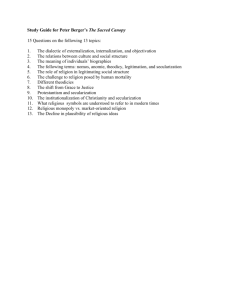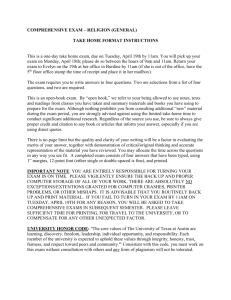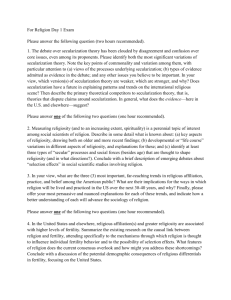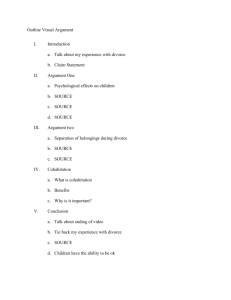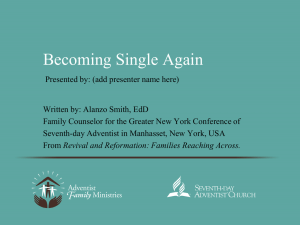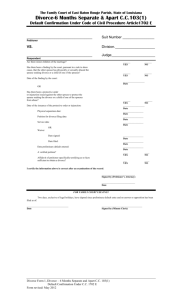PowerPoint Presentation - Creative
advertisement
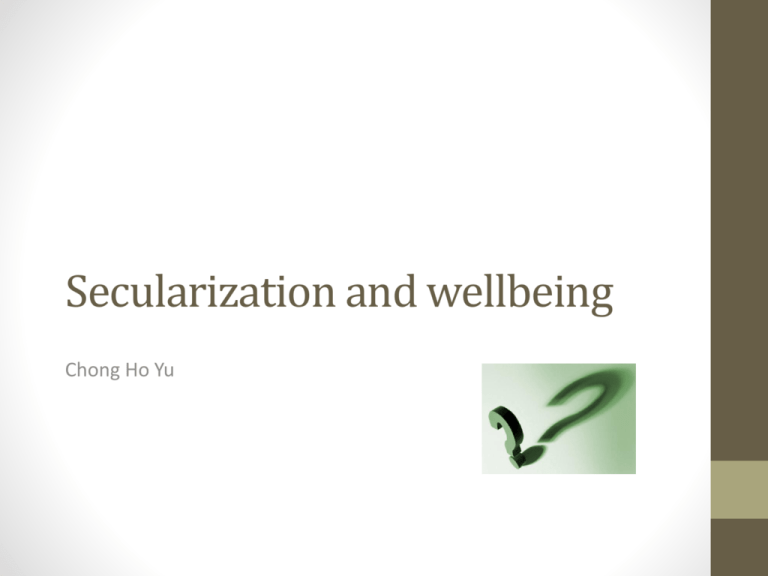
Secularization and wellbeing Chong Ho Yu • Gregory Paul: “unlike science, which goes where the evidence and analysis indicate and is anti-mythical in nature, religion is inherently dogmatic and opinion based, with myths being integral to the system.” • “All comprehensive cross comparisons have found that higher levels of religiosity are strongly correlated with inferior socioeconomics” (Paul, 2014). Is Religious America the worst? Evidence? Evidence? Evidence? Evidence? Evidence? Divorce rate • The divorce rate of the US is 53%. • According to the 2010 and 2011 United Nations Statistics and other sources, several other Western developed nations, such as Belgium, Portugal, France have worse divorce rates than the US. • Hungary, Czech Republic, Lithuania, and Estonia are former Communist nations. According to 2007-2008 Gallup Poll these countries are very secular. But their divorce rate is higher than religious US. Divorce According to 2012 United Nations Statistics, in terms of crude divorce rate, the top ten countries are Belarus, Latvia, Lithuania, Moldova, Denmark, Sweden, Czech Republic, Belgium, Liechtenstein, and Finland. The US is not among the top 30. Divorce • Paul wrote: "divorce is also high in America, and not among ungodly progressives, but among patriarchal evangelicals." • But no data are cited to support this. But there is evidence to support the otherwise. • Wilcox and Williamson (2007): Protestants that attend church regularly are 35% less likely to divorce compared to secular couples. But irregularly attending conservative Protestants are 20% more likely to divorce. • Wright and Stetzer (2010): Christians have a divorce rate of about 42%. But church service attendance is a crucial predictor of divorce. 60% of evangelicals who never attend church had been divorced or separated, compared to 38% of weekly attendees. Paradoxical • While it is true to some certain extent, the wellbeing indices selected are limited. • If the US is the worst in terms of wellbeing, why do so many people, including people from nations that have higher wellbeing indices, want to immigrate into the US? • By 2012, immigrants made up 13 percent of the US population. • From 2000 to 2012, there was a 31.2 percent increase in the foreign-born population in the US. • Indeed some statistical figures are wrong! Phil Zuckerman: Secularization • Author of “Faith no more”, “Society without God”, and ”Living the Secular Life”. • “An essential feature of most religions, according to founding sociologist Max Weber, is a deep hostility toward sex. And if the orientation toward sex is not quite one of deep hostility, almost every religion still maintains and seeks to impose some form of relatively restrictive sexual regulation that delineates who one can have sex with, as well as when, where, and how… Many religions spend a lot of time and energy making their adherents feel shame and guilt about sexual urges and desires. Sex becomes heavily associated with sin, uncleanliness, and moral depravity” Zuckerman • Religious America has one of the highest teenage pregnancy rates and secular democratic nations have the lowest rates. • Failure of the Christianity-based abstinence-only programs. • When US young people want to have sex, they are unprepared (Contraception). “Not under my roof!” • Schalet (2011): while American parents forbid their children to have premarital sex (“Not under my roof!”), Dutch parents allow young couples to sleep together at home and even provide them with contraceptives. • The teenage pregnancy rate of the Netherlands is far lower than that of the US. • Dutch youths have a healthier concept of the self, relationships, gender, autonomy, and authority. Dutch adolescents feel more satisfied and in control of their first sexual encounter than their American peers. And in addition, American young girls often experienced lowering self-esteem after the first intercourse. What do the statistics say? • 2012 figures: US teenage (aged 15-19) pregnancy rate is 39 out of 1000. • In the secular UK, 29 out of 1,000, the highest in West Europe. • Secularization of UK: 1.15% of Britons attend church Regularly. • Britons use more contraception than other European nations. How about Asia? • Singapore: Pregnancy rate is 6 out of 1000 • Japan: Pregnancy rate is 5 out of 1000 • Pippa Norris and Ronald Inglehart: the Japanese have a high degree of religiosity. • World Value survey: 41.3% Singaporeans regard religion as very important. Worldwide statistical evidence • Data from World Values Survey (2010-2014) • Lower overall secular values Happier! Worldwide statistical evidence • Secularization better wellbeing? • True to some extent • China is the most disbelieving nation in the world, yet its adult mortality rate is among the lowest Worldwide statistical evidence • GIS map of male adult mortality rate (UN 2015 database). • The high male adult mortality concentrates on the Africa continent and the former Soviet Bloc. • The variation of this wellbeing index might be better explained by political-historical factors rather than religiosity and secularization. Worldwide statistical evidence • Teenage birth rate: A proxy measure of measure (respect for females, sex education, lifestyles…etc.) • Skepticism: A proxy measure of secularization. More skeptical less religious • More secularization Higher teenage birth rate? Worldwide statistical evidence Discussion • The conclusion depends on: • How to define secularization • How to define happiness or wellbeing • Which database did you use? • What measurement and statistical procedures did you use? • Any thought?
